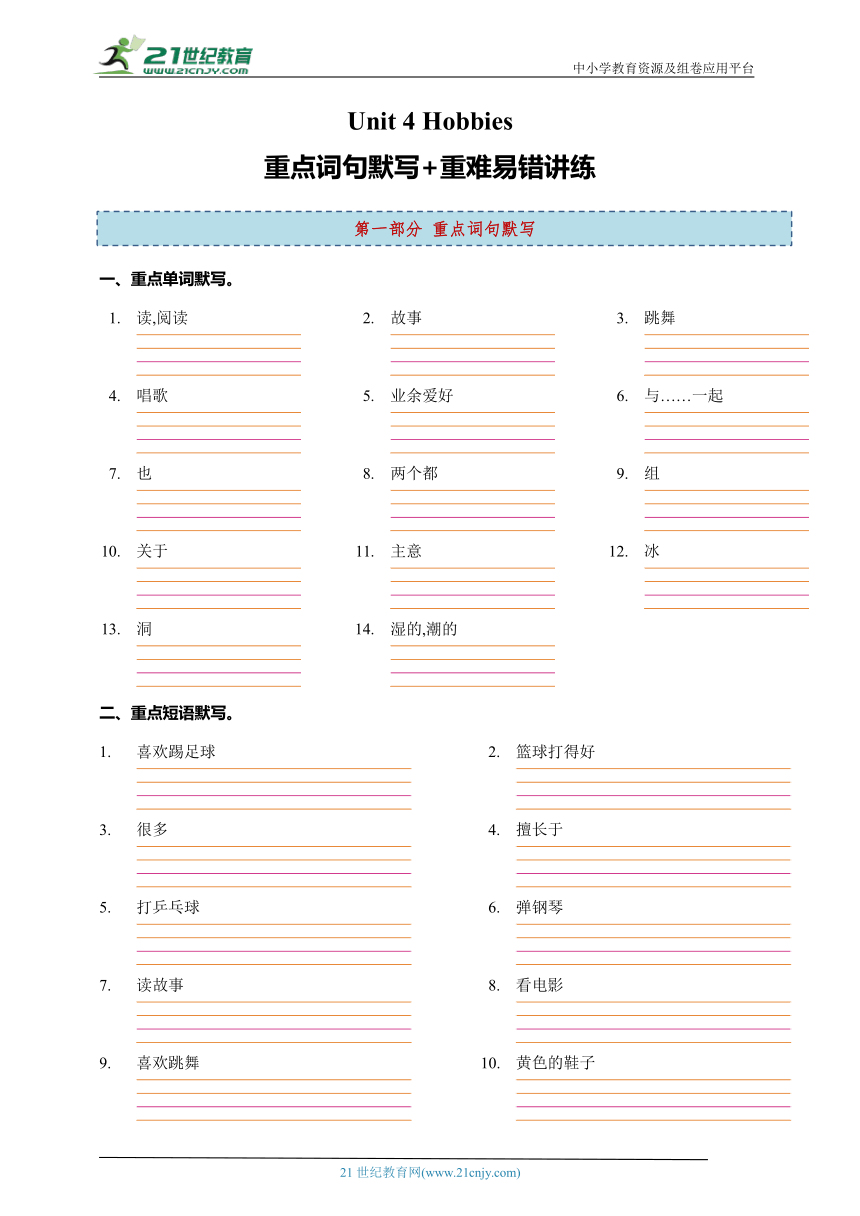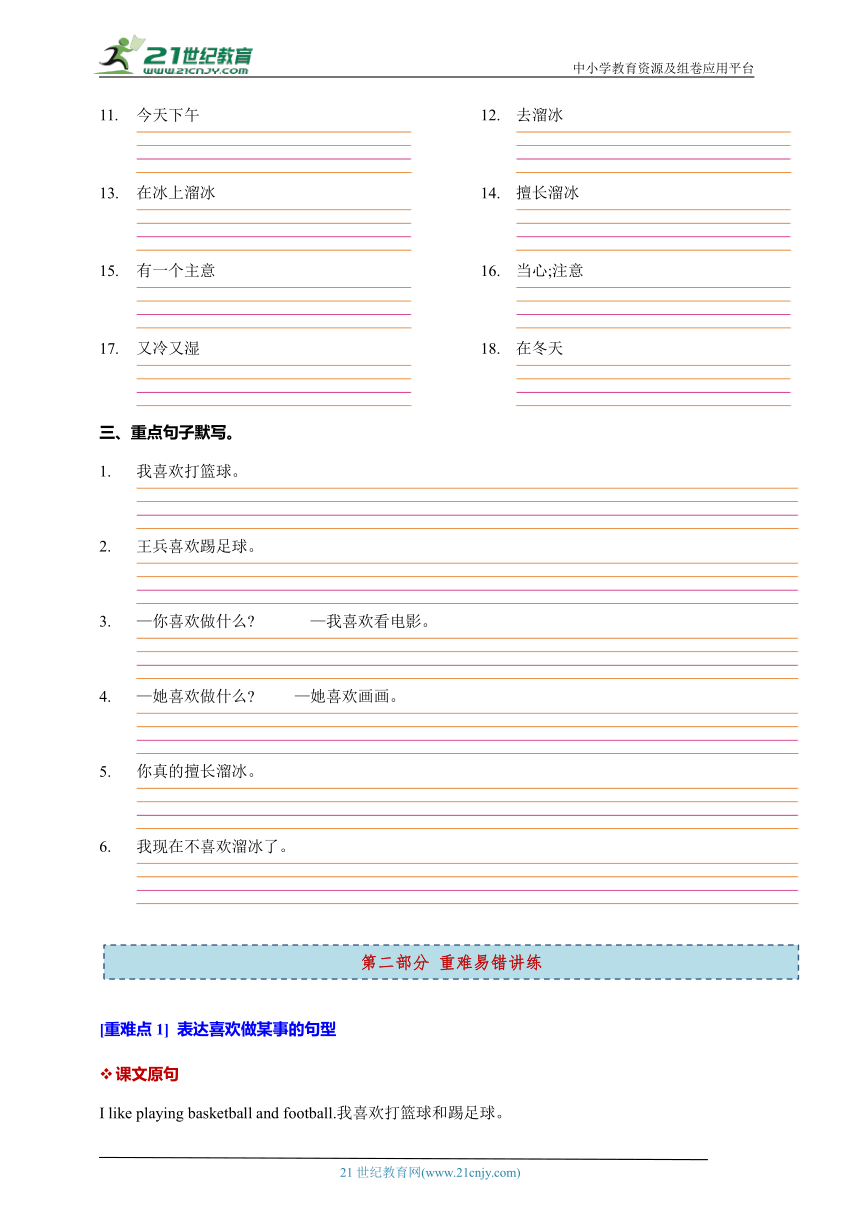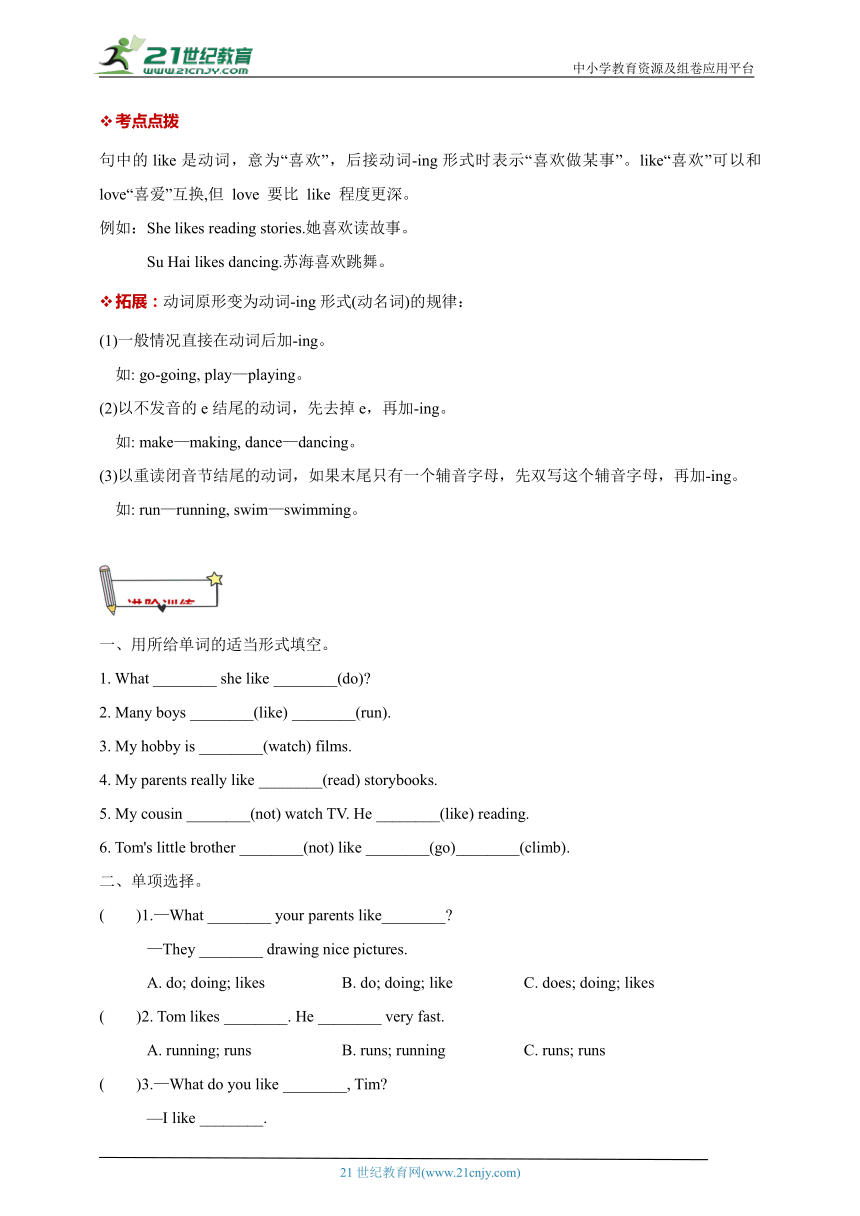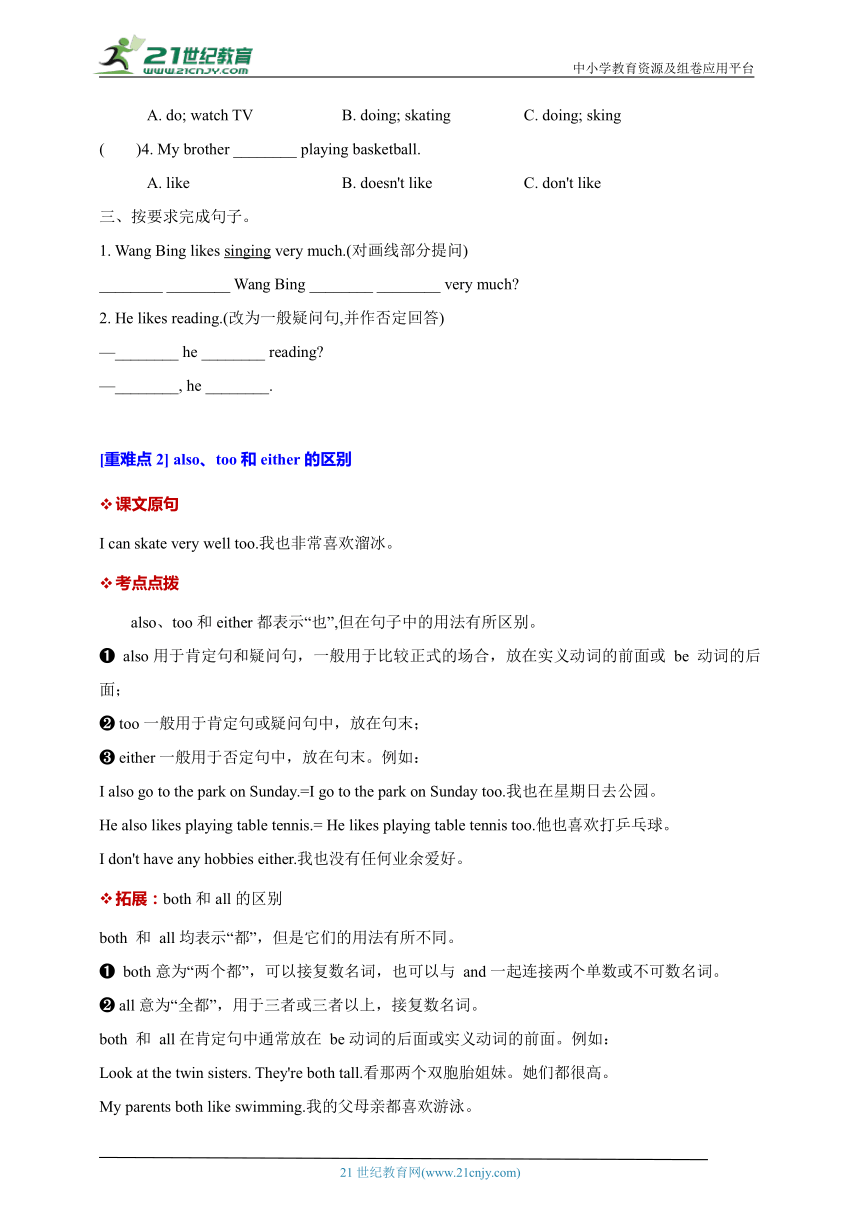Unit 4 Hobbies 重点词句默写+重难易错讲练(含答案)
文档属性
| 名称 | Unit 4 Hobbies 重点词句默写+重难易错讲练(含答案) |  | |
| 格式 | docx | ||
| 文件大小 | 367.5KB | ||
| 资源类型 | 试卷 | ||
| 版本资源 | 牛津译林版 | ||
| 科目 | 英语 | ||
| 更新时间 | 2024-11-06 10:26:57 | ||
图片预览




文档简介
中小学教育资源及组卷应用平台
Unit 4 Hobbies
重点词句默写+重难易错讲练
一、重点单词默写。
1. 读,阅读
2. 故事
3. 跳舞
4. 唱歌
5. 业余爱好
6. 与……一起
7. 也
8. 两个都
9. 组
10. 关于
11. 主意
12. 冰
13. 洞
14. 湿的,潮的
二、重点短语默写。
1. 喜欢踢足球
2. 篮球打得好
3. 很多
4. 擅长于
5. 打乒乓球
6. 弹钢琴
7. 读故事
8. 看电影
9. 喜欢跳舞
10. 黄色的鞋子
11. 今天下午
12. 去溜冰
13. 在冰上溜冰
14. 擅长溜冰
15. 有一个主意
16. 当心;注意
17. 又冷又湿
18. 在冬天
三、重点句子默写。
1. 我喜欢打篮球。
2. 王兵喜欢踢足球。
3. —你喜欢做什么 —我喜欢看电影。
4. —她喜欢做什么 —她喜欢画画。
5. 你真的擅长溜冰。
6. 我现在不喜欢溜冰了。
[重难点1] 表达喜欢做某事的句型
课文原句
I like playing basketball and football.我喜欢打篮球和踢足球。
考点点拨
句中的like是动词,意为“喜欢”,后接动词-ing形式时表示“喜欢做某事”。like“喜欢”可以和 love“喜爱”互换,但 love 要比 like 程度更深。
例如:She likes reading stories.她喜欢读故事。
Su Hai likes dancing.苏海喜欢跳舞。
拓展:动词原形变为动词-ing形式(动名词)的规律:
(1)一般情况直接在动词后加-ing。
如: go-going, play—playing。
(2)以不发音的e结尾的动词,先去掉e,再加-ing。
如: make—making, dance—dancing。
(3)以重读闭音节结尾的动词,如果末尾只有一个辅音字母,先双写这个辅音字母,再加-ing。
如: run—running, swim—swimming。
一、用所给单词的适当形式填空。
1. What ________ she like ________(do)
2. Many boys ________(like) ________(run).
3. My hobby is ________(watch) films.
4. My parents really like ________(read) storybooks.
5. My cousin ________(not) watch TV. He ________(like) reading.
6. Tom's little brother ________(not) like ________(go)________(climb).
二、单项选择。
( )1.—What ________ your parents like________
—They ________ drawing nice pictures.
A. do; doing; likes B. do; doing; like C. does; doing; likes
( )2. Tom likes ________. He ________ very fast.
A. running; runs B. runs; running C. runs; runs
( )3.—What do you like ________, Tim
—I like ________.
A. do; watch TV B. doing; skating C. doing; sking
( )4. My brother ________ playing basketball.
A. like B. doesn't like C. don't like
三、按要求完成句子。
1. Wang Bing likes singing very much.(对画线部分提问)
________ ________ Wang Bing ________ ________ very much
2. He likes reading.(改为一般疑问句,并作否定回答)
—________ he ________ reading
—________, he ________.
[重难点2] also、too和either的区别
课文原句
I can skate very well too.我也非常喜欢溜冰。
考点点拨
also、too和either都表示“也”,但在句子中的用法有所区别。
also用于肯定句和疑问句,一般用于比较正式的场合,放在实义动词的前面或 be 动词的后面;
too一般用于肯定句或疑问句中,放在句末;
either一般用于否定句中,放在句末。例如:
I also go to the park on Sunday.=I go to the park on Sunday too.我也在星期日去公园。
He also likes playing table tennis.= He likes playing table tennis too.他也喜欢打乒乓球。
I don't have any hobbies either.我也没有任何业余爱好。
拓展:both和all的区别
both 和 all均表示“都”,但是它们的用法有所不同。
both意为“两个都”,可以接复数名词,也可以与 and一起连接两个单数或不可数名词。
all意为“全都”,用于三者或三者以上,接复数名词。
both 和 all在肯定句中通常放在 be动词的后面或实义动词的前面。例如:
Look at the twin sisters. They're both tall.看那两个双胞胎姐妹。她们都很高。
My parents both like swimming.我的父母亲都喜欢游泳。
一、用 also, too或 either完成下列句子。
1. I don't like blue. I don't think you like it ________.
2. My friends are going to Beijing next year. I am ________ going to Beijing next year.
3. My sister is a good student. I am a good student ________.
4. I like swimming. My son likes it ________.
5. Today Su Hai isn't so good. Su Yang isn't good ________.
二、单项选择。
( )1. Bobby like Chinese. Sam likes Chinese too. They ________ Chinese.
A. all like B. both like C. like both
( )2. He ________ likes playing the guitar.
A. too B. both C. also
( )3. Liu Tao likes running ________.
A. both B. too C. also
( )4. Amy doesn't like running. She doesn't like skating ________.
A. too B. also C. either
三、按要求完成句子。
1. She likes cooking too.(改为同义句)
She ________ ________ cooking.
2. Mike likes playing basketball. Wang Bing likes playing basketball too.(合并为一句)
Mike and Wang Bing ________ ________ playing basketball.
参考答案
重点词句默写答案
重点单词默写
read读,阅读 story故事 dance跳舞 sing 唱歌
hobby业余爱好 with 与……一起 also 也 both 两个都 group组
about 关于 idea 主意 ice冰 hole 洞 wet 湿的,潮的
重点短语默写
like playing football 喜欢踢足球 play basketball well 篮球打得好 a lot of 很多
be good at擅长于 play table tennis 打乒乓球 play the piano弹钢琴
read stories 读故事 watch films 看电影 like dancing 喜欢跳舞
yellow shoes黄色的鞋子 this afternoon今天下午 go skating去溜冰
skate on the ice 在冰上溜冰 be good at skating 擅长溜冰 have an idea有一个主意
look out 当心;注意 cold and wet 又冷又湿 in winter 在冬天
重点句型默写
1. I like playing basketball. 我喜欢打篮球。
2. Wang Bing likes playing football. 王兵喜欢踢足球。
3. —What do you like doing 你喜欢做什么
—I like watching films. 我喜欢看电影。
4.—What does she like doing 她喜欢做什么
—She likes drawing. 她喜欢画画。
5. You're really good at skating. 你真的擅长溜冰。
6. I don't like skating now. 我现在不喜欢溜冰了。
重难易错讲练答案
1.表达喜欢做某事的句型
一、1. does, doing 2. like, running
3. watching 4. reading
5. doesn't, likes
6. doesn't, going climbing
二、1~4 B A B B
1.问句主语 your parents 是复数,助动词用 do, like 后面跟动词-ing形式,答句主语 They为第三人称复数,动词用原形,故选 B。
2. like 后接动词-ing形式, run的动词-ing形式为 running;第二个空的主语 He 为第三人称单数,谓语动词用第三人称单数形式,即runs,故选 A。
3.问句 like 后面跟动词-ing形式,句意: Tim,你喜欢做什么 询问喜欢做什么的句型为“ What do/ does... like doing ”,答句 like 后面跟动词-ing形式,故选 B。
4.句意:我的哥哥不喜欢打篮球。 My brother是第三人称单数,否定形式是 doesn't,故选 B。
三、1. What does, like doing 2. Does, like, No, doesn't
2. also、 too 和 either的区别
一、1. either 2. also 3. too 4. too 5. either
1.在否定句(don't)中用 either。
2.在 be 动词(am)之后用 also。
3.在肯定句尾用 too。
4.在肯定句尾用 too。
5.在否定句(isn't)中用 either。
二、1~4 B C BC
三、1. also likes 2. both like
21世纪教育网 www.21cnjy.com 精品试卷·第 2 页 (共 2 页)
21世纪教育网(www.21cnjy.com)
Unit 4 Hobbies
重点词句默写+重难易错讲练
一、重点单词默写。
1. 读,阅读
2. 故事
3. 跳舞
4. 唱歌
5. 业余爱好
6. 与……一起
7. 也
8. 两个都
9. 组
10. 关于
11. 主意
12. 冰
13. 洞
14. 湿的,潮的
二、重点短语默写。
1. 喜欢踢足球
2. 篮球打得好
3. 很多
4. 擅长于
5. 打乒乓球
6. 弹钢琴
7. 读故事
8. 看电影
9. 喜欢跳舞
10. 黄色的鞋子
11. 今天下午
12. 去溜冰
13. 在冰上溜冰
14. 擅长溜冰
15. 有一个主意
16. 当心;注意
17. 又冷又湿
18. 在冬天
三、重点句子默写。
1. 我喜欢打篮球。
2. 王兵喜欢踢足球。
3. —你喜欢做什么 —我喜欢看电影。
4. —她喜欢做什么 —她喜欢画画。
5. 你真的擅长溜冰。
6. 我现在不喜欢溜冰了。
[重难点1] 表达喜欢做某事的句型
课文原句
I like playing basketball and football.我喜欢打篮球和踢足球。
考点点拨
句中的like是动词,意为“喜欢”,后接动词-ing形式时表示“喜欢做某事”。like“喜欢”可以和 love“喜爱”互换,但 love 要比 like 程度更深。
例如:She likes reading stories.她喜欢读故事。
Su Hai likes dancing.苏海喜欢跳舞。
拓展:动词原形变为动词-ing形式(动名词)的规律:
(1)一般情况直接在动词后加-ing。
如: go-going, play—playing。
(2)以不发音的e结尾的动词,先去掉e,再加-ing。
如: make—making, dance—dancing。
(3)以重读闭音节结尾的动词,如果末尾只有一个辅音字母,先双写这个辅音字母,再加-ing。
如: run—running, swim—swimming。
一、用所给单词的适当形式填空。
1. What ________ she like ________(do)
2. Many boys ________(like) ________(run).
3. My hobby is ________(watch) films.
4. My parents really like ________(read) storybooks.
5. My cousin ________(not) watch TV. He ________(like) reading.
6. Tom's little brother ________(not) like ________(go)________(climb).
二、单项选择。
( )1.—What ________ your parents like________
—They ________ drawing nice pictures.
A. do; doing; likes B. do; doing; like C. does; doing; likes
( )2. Tom likes ________. He ________ very fast.
A. running; runs B. runs; running C. runs; runs
( )3.—What do you like ________, Tim
—I like ________.
A. do; watch TV B. doing; skating C. doing; sking
( )4. My brother ________ playing basketball.
A. like B. doesn't like C. don't like
三、按要求完成句子。
1. Wang Bing likes singing very much.(对画线部分提问)
________ ________ Wang Bing ________ ________ very much
2. He likes reading.(改为一般疑问句,并作否定回答)
—________ he ________ reading
—________, he ________.
[重难点2] also、too和either的区别
课文原句
I can skate very well too.我也非常喜欢溜冰。
考点点拨
also、too和either都表示“也”,但在句子中的用法有所区别。
also用于肯定句和疑问句,一般用于比较正式的场合,放在实义动词的前面或 be 动词的后面;
too一般用于肯定句或疑问句中,放在句末;
either一般用于否定句中,放在句末。例如:
I also go to the park on Sunday.=I go to the park on Sunday too.我也在星期日去公园。
He also likes playing table tennis.= He likes playing table tennis too.他也喜欢打乒乓球。
I don't have any hobbies either.我也没有任何业余爱好。
拓展:both和all的区别
both 和 all均表示“都”,但是它们的用法有所不同。
both意为“两个都”,可以接复数名词,也可以与 and一起连接两个单数或不可数名词。
all意为“全都”,用于三者或三者以上,接复数名词。
both 和 all在肯定句中通常放在 be动词的后面或实义动词的前面。例如:
Look at the twin sisters. They're both tall.看那两个双胞胎姐妹。她们都很高。
My parents both like swimming.我的父母亲都喜欢游泳。
一、用 also, too或 either完成下列句子。
1. I don't like blue. I don't think you like it ________.
2. My friends are going to Beijing next year. I am ________ going to Beijing next year.
3. My sister is a good student. I am a good student ________.
4. I like swimming. My son likes it ________.
5. Today Su Hai isn't so good. Su Yang isn't good ________.
二、单项选择。
( )1. Bobby like Chinese. Sam likes Chinese too. They ________ Chinese.
A. all like B. both like C. like both
( )2. He ________ likes playing the guitar.
A. too B. both C. also
( )3. Liu Tao likes running ________.
A. both B. too C. also
( )4. Amy doesn't like running. She doesn't like skating ________.
A. too B. also C. either
三、按要求完成句子。
1. She likes cooking too.(改为同义句)
She ________ ________ cooking.
2. Mike likes playing basketball. Wang Bing likes playing basketball too.(合并为一句)
Mike and Wang Bing ________ ________ playing basketball.
参考答案
重点词句默写答案
重点单词默写
read读,阅读 story故事 dance跳舞 sing 唱歌
hobby业余爱好 with 与……一起 also 也 both 两个都 group组
about 关于 idea 主意 ice冰 hole 洞 wet 湿的,潮的
重点短语默写
like playing football 喜欢踢足球 play basketball well 篮球打得好 a lot of 很多
be good at擅长于 play table tennis 打乒乓球 play the piano弹钢琴
read stories 读故事 watch films 看电影 like dancing 喜欢跳舞
yellow shoes黄色的鞋子 this afternoon今天下午 go skating去溜冰
skate on the ice 在冰上溜冰 be good at skating 擅长溜冰 have an idea有一个主意
look out 当心;注意 cold and wet 又冷又湿 in winter 在冬天
重点句型默写
1. I like playing basketball. 我喜欢打篮球。
2. Wang Bing likes playing football. 王兵喜欢踢足球。
3. —What do you like doing 你喜欢做什么
—I like watching films. 我喜欢看电影。
4.—What does she like doing 她喜欢做什么
—She likes drawing. 她喜欢画画。
5. You're really good at skating. 你真的擅长溜冰。
6. I don't like skating now. 我现在不喜欢溜冰了。
重难易错讲练答案
1.表达喜欢做某事的句型
一、1. does, doing 2. like, running
3. watching 4. reading
5. doesn't, likes
6. doesn't, going climbing
二、1~4 B A B B
1.问句主语 your parents 是复数,助动词用 do, like 后面跟动词-ing形式,答句主语 They为第三人称复数,动词用原形,故选 B。
2. like 后接动词-ing形式, run的动词-ing形式为 running;第二个空的主语 He 为第三人称单数,谓语动词用第三人称单数形式,即runs,故选 A。
3.问句 like 后面跟动词-ing形式,句意: Tim,你喜欢做什么 询问喜欢做什么的句型为“ What do/ does... like doing ”,答句 like 后面跟动词-ing形式,故选 B。
4.句意:我的哥哥不喜欢打篮球。 My brother是第三人称单数,否定形式是 doesn't,故选 B。
三、1. What does, like doing 2. Does, like, No, doesn't
2. also、 too 和 either的区别
一、1. either 2. also 3. too 4. too 5. either
1.在否定句(don't)中用 either。
2.在 be 动词(am)之后用 also。
3.在肯定句尾用 too。
4.在肯定句尾用 too。
5.在否定句(isn't)中用 either。
二、1~4 B C BC
三、1. also likes 2. both like
21世纪教育网 www.21cnjy.com 精品试卷·第 2 页 (共 2 页)
21世纪教育网(www.21cnjy.com)
